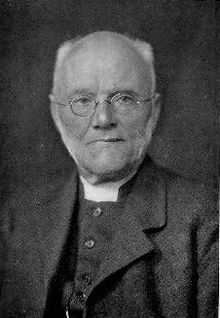John Scott Lidgett

The Reverend John Scott Lidgett, CH (Lewisham, 10 August 1854 – Epsom, 16 June 1953) was a British Wesleyan Methodist minister and educationist. He achieved prominence both as a theologian and reformer within British Methodism, stressing the importance of the church's engagement with the whole of society and human culture, and as an effective advocate for education within London.[1]
Education
Lidgett was educated at University College, London, entering in 1873, taking his BA in 1874 and his MA in 1875; he was awarded a DD by the University of Aberdeen on the strength of a book published in 1902, The fatherhood of God. In later life, he was closely involved with the University of London, serving on its Senate from 1922 until he retired in 1946 at the age of 92. He served as deputy vice-chancellor and as Vice-Chancellor from 1930 to 1932. He was active in supporting the development of women's colleges and, through his support for the university's relations with teacher training colleges, was instrumental in the foundation of its Institute of Education.
Theology
By the standards of 19th century British Methodism, Lidgett's theology was liberal. He rejected the penal substitution doctrine of the atonement, and wanted to move his denomination away from its inherited tendency to a narrow evangelical stance, towards a social gospel. He founded the Bermondsey Settlement, the only Methodist foundation among the 19th century settlements in the East End of London. Like the secular settlements such as Toynbee Hall, it aimed to bring into the neighbourhood middle class activists who could provide social and educational facilities for the poor, rather than concentrating narrowly on evangelism like the Church's more traditional "Missions" located in poor areas of London.
Within the Church Lidgett founded the "Wesley Guild", a social organization aimed at young people but also offering activities to adults, which claimed over 150,000 members by 1900. He was President of the Wesleyan Methodist Conference (the ruling body of the denomination) in 1908-09. He was also an early supporter of the ecumenical movement and a key architect of British Methodist Union in 1932, and was the first President of the newly united church's conference. He remained in the active work of the ministry as chairman of the London South-West Methodist District until he was 94.
Lidgett was active in London politics for much of his career. He served as an alderman of the London County Council, and was leader of the Progressive Party on the Council from 1918 to 1928. He was prominent on the LCC Education Committee. He was made a Companion of Honour in 1933.
Personal life
Lidgett married Emmeline Davies in 1884. They had a son (John Cuthbert Lidgett, b.1885, killed in action 1918) and a daughter (Lettice Mary Lidgett, b.1887, m. Gerald H. Davy 1911,[2] d.1980[3]). Emmeline died in 1934.
Lidgett died at Epsom on 16 June 1953, and was buried at West Norwood Cemetery.
Published works
- The Spiritual Principle of the Atonement (the 1897 Fernley lecture)
- The Fatherhood of God (1902)
- The Christian Religion, its Meaning and Proof (1907)
- God in Christ Jesus (1915)
- Sonship and Salvation (1921.
- The Victorian Transformation of Theology (the 1934 Maurice lectures)
- The Idea of God and Social Ideals (1938).
See also
- List of Vice-Chancellors of the University of London
- List of British university chancellors and vice-chancellors
References
- ↑ Martin Wellings (2004). "Lidgett, John Scott (1854–1953)". Oxford Dictionary of National Biography, Oxford University Press, 2004. Retrieved 20 August 2012.
- ↑ England and Wales Civil Registration Indexes. London, England: General Register Office. 1911, October quarter; Vol. 12, p. 2105
- ↑ England and Wales Civil Registration Indexes. London, England: General Register Office, 1980, Vol. 16, p. 2078
Bibliography
- Turberfield, A. F. (2002). John Scott Lidgett: Archbishop of British Methodism?. Peterborough: Epworth Press. ISBN 978-0-7162-0571-5.
- Wellings, M. (2004). John Scott Lidgett (1854–1953). In Oxford Dictionary of National Biography. Oxford: Oxford University Press. doi:10.1093/ref:odnb/34530
External links
| Academic offices | ||
|---|---|---|
| Preceded by Sir Gregory Foster |
Vice-Chancellor of the University of London 1930-1932 |
Succeeded by John Leigh Smeathman Hatton |
|